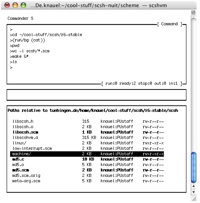Well, if this LtU news is to be believed, since a couple of weeks ago, Linspire is using Haskell as its main OS development language:
The OS team at Linspire, Inc. would like to announce that we are standardizing on Haskell as our preferred language for core OS development.
We are redoing a bunch of our infrastructure using Haskell as our common standard language. Our first task is redoing our Debian package builder (aka autobuilder) in Haskell. Other tools such as ISO builders, package dependency checkers are in progress. The goal is to make a really tight simple set of tools that will let developers contribute to Freespire, based on Debian tools whenever possible. Our hardware detector, currently in OCaml, is on the block to be rewritten as well.
This surprising announcement was made at the Debian Haskell Mailing List, since Linspire (and its free variant, Freespire) is based in Debian. This is what these brave developers have to say of the topical worries against such a move:
I mention Freespire because some of our colleagues were concerned that using Haskell would isolate us from the larger community of developers and make it hard to find new employees skilled in Haskell, should we need to. From our perspective, functional programming makes us more effective and we think that getting even a few people who know Haskell hacking with us is a better combination than lots of Perl and bash.
If it is a late April’s Fools joke, please someone tell me!





